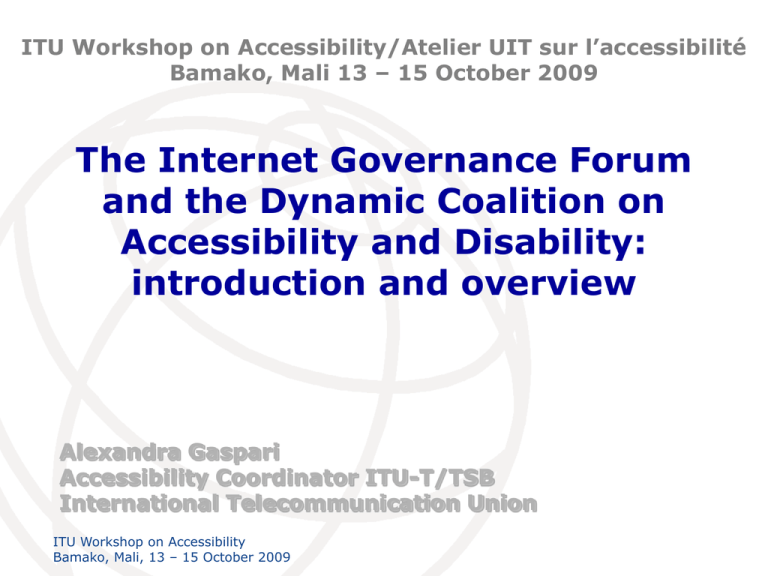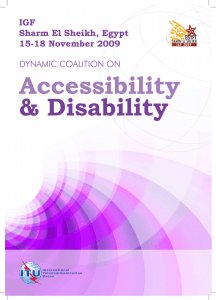The Internet Governance Forum and the Dynamic Coalition on Accessibility and Disability:
advertisement

ITU Workshop on Accessibility/Atelier UIT sur l’accessibilité Bamako, Mali 13 – 15 October 2009 The Internet Governance Forum and the Dynamic Coalition on Accessibility and Disability: introduction and overview Alexandra Gaspari Accessibility Coordinator ITU-T/TSB International Telecommunication Union ITU Workshop on Accessibility Bamako, Mali, 13 – 15 October 2009 International Telecommunication Union What is the Internet Governance Forum - IGF The Internet Governance Forum (IGF) is a relatively new forum for multi-stakeholder policy dialogue the Internet Governance Forum (IGF). Its purpose is to support the United Nations Secretary-General in carrying out the mandate from the World Summit on the Information Society (WSIS) The mandate of the forum is: To discuss public policy issues related to key elements of Internet governance in order to foster the sustainability, robustness, security, stability and development of the Internet; To facilitate the dialogue between bodies dealing with different cross-cutting international public policies regarding the Internet and discuss issues that do not fall within the scope of any existing body; The IGF website www.intgovforum.org provides an interactive, collaborative space where all stakeholders can air their views and exchange ideas. ITU Workshop on Accessibility Bamako, Mali, 13 – 15 October 2009 International Telecommunication Union 2 What is the mandate of the Internet Governance Forum The mandate of the IGF is to be of a discussion forum for facilitating dialogue between the participants. The IGF may "identify emerging issues, bring them to the attention of the relevant bodies and the general public, and, where appropriate, make recommendations" IGF does not have any direct decisionmaking authority. ITU Workshop on Accessibility Bamako, Mali, 13 – 15 October 2009 International Telecommunication Union 3 What are the Dynamic Coalitions At the inaugural Meeting of the IGF in Athens, in 2006, the dynamic coalitions are established. These coalitions are informal and address specific issues. They consist of groups of stakeholders that are interested in a particular area, like for instance, accessibility. Most coalitions allow participation of anyone interested in contributing. Thus, these groups gather not only academics and representatives of governments, but also members of the civil society interested in participating on the debates and engaged in the coalition's works. The one we would like to present to you today is the Dynamic Coalition on Accessibility and Disability – DCAD. ITU Workshop on Accessibility Bamako, Mali, 13 – 15 October 2009 International Telecommunication Union 4 What is the Dynamic Coalition on Accessibility and Disability - DCAD The DCAD is one of the most active and prolific dynamic coalitions in the IGF. The DCAD produced a after the Rio in 2007 a report to improve accessibility for persons with Disabilities to IGF meetings In the following year, the DCAD submitted to the IGF its Declaration on Accessibility and Disability. The next three slides give an overview of the declaration: ITU Workshop on Accessibility Bamako, Mali, 13 – 15 October 2009 International Telecommunication Union 5 The DCAD Hyderabad Declaration 1/3 Extracts from the “ 06 Dec. 2008, 3rd IGF Meeting, Hyderabad, India Hyderabad Declaration on IGF Accessibility for Persons with Disabilities - Proposed by the Dynamic Coalition on Accessibility and Disability (DCAD)”: (…) Urge all governments to support the process of adoption, ratification and implementation of the United Nations Convention on the Rights of Persons with Disabilities, in particular the enactment of national legislation, as it contains strong elements concerning information and communication accessibility for persons with disabilities; Strongly request that any international, regional and national IGF-related development program, funding or assistance, aimed to achieve the inclusive information society be made disability-inclusive, both through mainstreaming and disability-specific approaches; ITU Workshop on Accessibility Bamako, Mali, 13 – 15 October 2009 International Telecommunication Union 6 The DCAD Hyderabad Declaration 2/3 (…) Strongly urge that the needs of persons with disabilities be included in all aspects of designing, developing, distributing and deploying of appropriation strategies of information and communication technologies, including information and communication services, so as to ensure accessibility for persons with disabilities; Strongly urge that basic building blocks of assistive technologies, such as Text to Speech and Speech to Text software, Interactive Voice Command, Real time text solutions, Optical Character Recognition software and language rule tables for Braille transcription, are developed with high priority for all languages of all countries and licensed under an open source license, and open standards for structured access to oral and visual knowledge to enable development of various assistive technologies, such as screen reading software, text reading systems, talking mobile phones, talking ATMs, and real time text alternative communications that depend on these basic building blocks; ITU Workshop on Accessibility Bamako, Mali, 13 – 15 October 2009 International Telecommunication Union 7 The DCAD Hyderabad Declaration 3/3 (…) Urge all governments to design ICT procurement and intellectual property policies in a way that promotes the adoption of vendor-neutral solutions, the acquisition of technologies that comply with open standards, and in general implement policies that enable and promote the availability of affordable assistive technologies, including open source software; Call upon all governments and participants to promote the active and equal involvement of persons with disabilities in all IGF projects, initiatives, and delegations and to make the implementation, evaluation and monitoring of IGF documents and communications to be inclusive of persons with disabilities since this action is paramount for achieving an inclusive society; ITU Workshop on Accessibility Bamako, Mali, 13 – 15 October 2009 International Telecommunication Union 8 The impact of the DCAD in IGF The DCAD present and past projects are developed by the members throughout the entire year via live remote and web accessible captioned conference calls. Captioning like the ones arranged today here in Bamako, allow the participation from all over the world including persons with disabilities. The DCAD is also a democratic process that enables the members to not only communicate the needs but solutions as well to improve accessibility for persons with disabilities to IGF as whole at the annual meeting. ITU Workshop on Accessibility Bamako, Mali, 13 – 15 October 2009 International Telecommunication Union 9 The role of ITU-T in the DCAD The ITU-T initiated and sponsors the Dynamic Coalition on Accessibility and Disability (DCAD) by providing a website, secretariat support and a coordinator, so that persons with disabilities can actively and directly participate in IGF activities. The key person in ITU-T that has sponsored the DCAD and provided the support to the DCAD is the Director for the Standardization Bureau, Mr. Malcolm Johnson. ITU Workshop on Accessibility Bamako, Mali, 13 – 15 October 2009 International Telecommunication Union 10 Who are the key actors of the DCAD DCAD members (representatives from all over the world active in the field of accessibility and Information and Communication Technologies – ICTs) Andrea J Saks, Coordinator of the IGF Dynamic Coalition of Accessibility and Disability ITU Workshop on Accessibility Bamako, Mali, 13 – 15 October 2009 International Telecommunication Union 11 Next DCAD Meeting and workshops The IGF Dynamic Coalition on Accessibility and Disability (DCAD) will meet face to face in Sharm El Sheikh, Egypt, on the 16 November 2009. This year DCAD will present the MESSAGE in the Accessibility and Diversity main session on Accessibility and Disability. In Egypt, the DCAD will organize: a supersession workshop on Global Internet access for persons with disabilities and Best Practice Forum on Web Accessibility ITU Workshop on Accessibility Bamako, Mali, 13 – 15 October 2009 International Telecommunication Union 12 Conclusions The DCAD has taken its advisory role very seriously and has been gratified to see its suggestions and presence taken serious by the IGF management team as well the by the host countries. It’s has had a real impact and has uplifted the awareness of IGF members that Accessibility for persons with Disability is achievable and most desirable. There is still much work to be done. This is an opportunity for everyone to come and participate in the workings of this Coalition. DCAD welcomes new members to join us in this important work. ITU Workshop on Accessibility Bamako, Mali, 13 – 15 October 2009 International Telecommunication Union 13 Thank you for your attention! Questions? http://www.itu.int/themes/accessibility/dc/ http://www.intgovforum.org/cms/index.php/dynamiccoalitions E-mail: alexandra.gaspari@itu.int E-mail: dcadsecretariat@itu.int Tel: +41 22 730 5158 ITU Workshop on Accessibility Bamako, Mali, 13 – 15 October 2009 International Telecommunication Union 14
